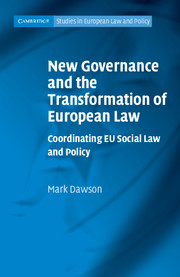Book contents
- Frontmatter
- Contents
- Series editors’ preface
- Acknowledgments
- Table of cases
- Table of treaties
- Table of legislation
- Table of Council Decisions
- Introduction
- 1 The origins of an Open Method of Coordination
- 2 Relating governance and law
- 3 Governance as proceduralisation
- 4 Assessing the procedural paradigm
- 5 Constitutionalising new governance
- Epilogue The future of the Open Method of Coordination
- Annex 1 Questions for the respondents
- Annex 2 List of non-governmental respondents
- Annex 3 History and development of the OMC SPSI (1997–2010)
- Annex 4 The new ‘streamlined’ OMC SPSI (2008–10)
- Bibliography
- Index
- References
1 - The origins of an Open Method of Coordination
Published online by Cambridge University Press: 05 November 2011
- Frontmatter
- Contents
- Series editors’ preface
- Acknowledgments
- Table of cases
- Table of treaties
- Table of legislation
- Table of Council Decisions
- Introduction
- 1 The origins of an Open Method of Coordination
- 2 Relating governance and law
- 3 Governance as proceduralisation
- 4 Assessing the procedural paradigm
- 5 Constitutionalising new governance
- Epilogue The future of the Open Method of Coordination
- Annex 1 Questions for the respondents
- Annex 2 List of non-governmental respondents
- Annex 3 History and development of the OMC SPSI (1997–2010)
- Annex 4 The new ‘streamlined’ OMC SPSI (2008–10)
- Bibliography
- Index
- References
Summary
Introduction
The peculiar interest of lawyers in the Open Method of Coordination (OMC) has often revolved around two elements, or two supposed advantages, that the turn to governance in the EU could represent. The first has been discussed under the heading of ‘directly-deliberative polyarchy’ (DDP), or alternatively ‘democratic experimentalism’. What advantages does the OMC offer for the democratic character of European law? Can it be said to provide a new basis for legitimating law in a transnational environment, or linking it to the concerns of affected parties? Or is it, alternatively, an instrument designed to centralise power above and beyond the confines of Europe’s constitutional framework?
The second set of questions revolves around more social concerns. To what extent does the OMC imply not just a change in how we conceive of law’s democratic pedigree, but also in its relationship to a surrounding society? Whereas experimentalism’s critique aims at the static nature of the European legal order (its distance from a more dynamic ‘underworld’ of regulatory practice), the critique offered by those lamenting Europe’s ‘social deficit’ is targeted at European law’s obliqueness; its failure to consider the social impact of what it is doing, or engage with questions of how European integration is protecting or inhibiting the reconstruction of the welfare state.
- Type
- Chapter
- Information
- New Governance and the Transformation of European LawCoordinating EU Social Law and Policy, pp. 24 - 68Publisher: Cambridge University PressPrint publication year: 2011



